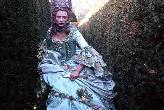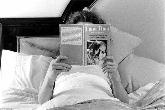| SOUNDTRACK SCREENPLAY DOWNLOADS SCREENINGS DVD |  |
|
|
 |
 |
 |
 |
 |
 |
|
||||||
|
Mexico The Critic The Rivera Murals The Casa Azul Jet-lag Festival Screening The Trotsky Museum Exile Profound Mexico Hope Rain on canvas The Jury The Anthropological Museum Time Political Correctness Two Houses False Virtue Life is a miracle Weird Roots The Meeting Turtles Can Fly The Oscars Luis Barragans house Back to Diary Index |
Weird Roots I am struck by the confidence of filmmakers (and musicians) who seem to know and work from their roots. I think of others such as Pedro Almodovar in People have often erroneously assumed I am Jewish, because of the Jewish subject matter of ‘The Man Who Cried’, and because of the references to Martin Buber, the Jewish philosopher, as well as some of the dialogue in ‘The Tango Lesson’, concerning the relationship between Jewish mythology, identity, and the roots of the tango. I try to explain that you don’t have to be Jewish to want to explore such vital subject matter; nor do I have to be male or Arabic to want, in YES, to explore the identities and struggles of a man from the Middle-East. Nevertheless, I wonder what it would take for me to be able to explore my own weird roots more deeply. My family is such an odd mix; part French (on my maternal side) part aristocratic, part working class (on my paternal side); anarchist (my father); poor (my own childhood) yet privileged (always music and a poem in the house). There was nothing in my background of what is usually portrayed as ‘Englishness’. No chintz (my father was a committed modernist); no roses (there wasn’t a garden) and not a hind of patriotism. My brother and I played in the backyard of the house next door, with a large, poor, Irish family of children, building towering stage-coaches out of old boxes, cowering with fear when their violent, alcoholic father returned at night and beat them. But my loving grandparents lived in a house in Hampstead full of antiques and listened to opera on the radio. It was a childhood of contradictions, shot through with theatricality, (both my grandmothers were actresses), radical liberalism, and a kind of family chaos that left me, as a child, profoundly independent. Apparently even at the age of two I would wander off alone all day. What was I doing? What did I see? One thing I do know; laughter was redemption. I am longing to make a film that is really, really funny. Whenever I sit in the cinema and hear an audience laugh during one of my films, I feel it to be a vindication, a kind of healing nectar. back next |
 ’Orlando’, 1992  ’The Tango Lesson’, 1997 |
||||
Text © Sally Potter. All pictures © Adventure Pictures unless otherwise indicated |